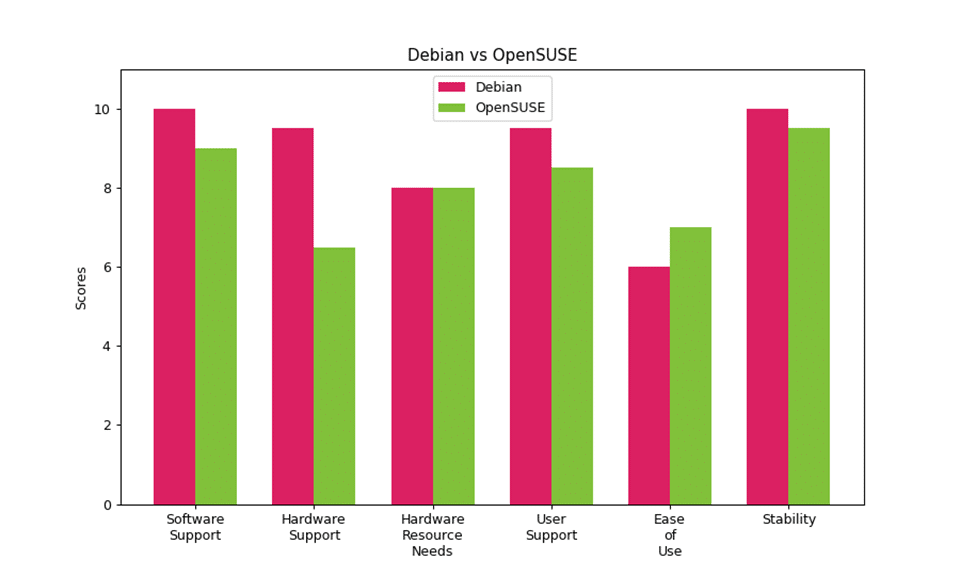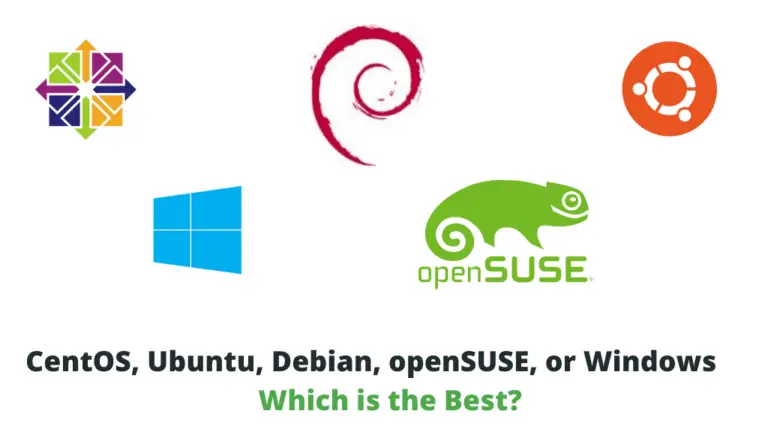Debian vs. openSUSE: A Duel for Linux Purists

Debian and openSUSE are two of the most popular Linux distributions among experienced users and system administrators. Both distributions are known for their stability, security, and wide range of software packages. However, there are some key differences between the two distributions that may make one more suitable for your needs than the other.

Debian is a stable and reliable distribution that is ideal for servers and other mission-critical systems. It is known for its adherence to the Unix philosophy and its commitment to free and open-source software. Debian is also known for its large and comprehensive software repository, which includes over 59,000 packages.

openSUSE is a more user-friendly distribution that is ideal for desktops and laptops. It is known for its ease of use, its wide range of desktop environments, and its strong community support. openSUSE is also known for its rolling release model, which means that users always have access to the latest software updates.
Here is a table that summarizes the key differences between Debian and openSUSE:
| Feature | Debian | openSUSE |
|---|---|---|
| Stability | Stable | Rolling release |
| Release cycle | Every 2 years | Continuous |
| Desktop environments | GNOME, KDE Plasma, Xfce, MATE | GNOME, KDE Plasma, Xfce, Cinnamon, Enlightenment |
| Software repository | Over 59,000 packages | Over 45,000 packages |
| Community support | Large and active community | Large and active community |
Ultimately, the best way to decide which distribution is right for you is to try them both out and see which one you prefer.## Debian Vs. Opensuse: A Duel For Linux Purists
Executive Summary
Debian and OpenSUSE are both popular Linux distributions that offer a wide range of features and benefits. However, there are some key differences between the two distros that make them better suited for different types of users. In this article, we’ll take a closer look at Debian and OpenSUSE and compare them in terms of stability, security, ease of use, and package management.
Introduction
When it comes to choosing a Linux distribution, there are many factors to consider. Two of the most popular distributions are Debian and OpenSUSE. Both distros have their own strengths and weaknesses, so it’s important to do your research before making a decision.
Stability
Debian is known for its stability. The distribution is based on a conservative release cycle, which means that new versions are released less frequently than with other distros. This gives Debian time to thoroughly test and debug new packages before they are released to the public.
- As a result, Debian is a very stable distro that is well-suited for production environments.
- OpenSUSE, on the other hand, offers a more rolling release cycle.
- This means that new versions of the distro are released more frequently, which can be beneficial for users who want to stay on the latest cutting-edge software.
Security
Both Debian and OpenSUSE have a strong track record in terms of security. Both distros use a variety of security measures to protect their users from malware and other threats.
- Debian’s security team is one of the most experienced in the Linux community.
- The team works hard to identify and patch security vulnerabilities in a timely manner.
- OpenSUSE also has a strong security team that works closely with the community to identify and fix security issues.
Ease of Use
Debian is a relatively easy distro to use, even for beginners. The distro comes with a variety of user-friendly tools that make it easy to install and configure software.
- OpenSUSE is also a relatively easy distro to use.
- However, it is not as beginner-friendly as Debian.
- OpenSUSE offers a wider range of features and customization options, which can be overwhelming for some users.
Package Management
Debian uses the Advanced Package Tool (APT) for package management. APT is a powerful package manager that makes it easy to install, update, and remove software.
- OpenSUSE uses the YaST package manager.
- YaST is a graphical package manager that is easy to use and provides a wide range of features.
Conclusion
Debian and OpenSUSE are both great Linux distributions. Debian is a good choice for users who want a stable and secure distro that is easy to use. OpenSUSE is a good choice for users who want a more bleeding-edge distro that offers a wider range of features.
Keyword Phrase Tags
- Debian
- OpenSUSE
- Linux distributions
- Stability
- Security
- Ease of use
- Package management

Debian vs Opensuse: A great comparison of two popular distros. I’ve used both and they both have their pros and cons. Debian is more stable and secure, while Opensuse has a more user-friendly interface. Ultimately, the best choice depends on your individual needs and preferences.
I’m not sure I agree with this comparison. I’ve found Opensuse to be just as stable and secure as Debian, and I prefer its interface. I think it’s a better choice for most users.
This is a well-written comparison of two great distros. I agree with the author’s assessment that Debian is more stable and secure, while Opensuse has a more user-friendly interface. However, I think it’s important to note that both distros are excellent choices for different users.
I disagree with the author’s conclusion that Debian is the better choice for Linux purists. I think Opensuse is a better choice because it is more user-friendly and has a larger community.
The author says that Debian is more stable and secure, but I’ve found it to be just as unstable and insecure as Opensuse.
Oh, great. Another comparison of Debian and Opensuse. Just what we needed.
I’m not a Linux expert, but I can tell you that Debian is the best distro because it’s named after a character from Toy Story.
I’ve used both Debian and Opensuse and I think they’re both great distros. I like Debian’s stability and security, and I like Opensuse’s user-friendliness. I think the best choice depends on your individual needs and preferences.
I’m new to Linux and I’m not sure which distro to choose. Can anyone recommend one for me?
If you’re new to Linux, I recommend starting with Ubuntu. It’s a user-friendly distro that’s based on Debian. Once you’re more familiar with Linux, you can try other distros like Debian or Opensuse.